(page1).jpg.jpg)
Title: Colored American - April 8, 1837
Speaker or author: editor
Newspaper or publication: Colored American (1837 - 1842)
The writer expresses his disagreement with the thoughts of his white friends that black Americans should be taught to be content with their lot in life. He believes that in order to earn the respect of others, black Americans should respect themselves first. This self respect does not include settling for less than a moral, virtuous, and industrious life.
Description of file(s): one scanned, one columned, newspaper page
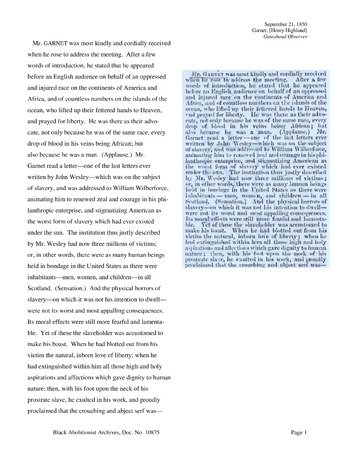
Speaker or author: Garnet, Henry Highland, 1815-1882
Newspaper or publication: Gateshead Observer
Passionate speech regarding the suffering of human beings under slavery in the U.S. The speaker emphasized the abuses and injustices inflicted upon "... as many human beings held in bondage in the United States as there were inhabitants...in all Scotland."
Description of file(s): PDF 5 page, 1,246 word document (text and images)
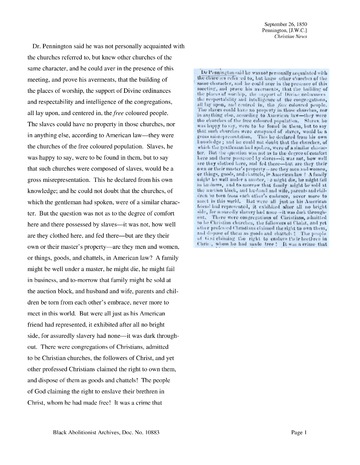
Speaker or author: Pennington, James W. C.
Newspaper or publication: Christian News
Speech regarding the ongoing debate about whether slaves are content with their lives. The speaker was responding to another speaker who expressed his belief that the "social condition" of U.S. slaves was positive and offered an example of their general contentment.
Description of file(s): PDF 2 page, 368 word document (text and images)
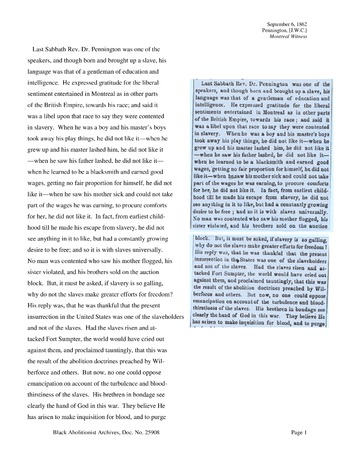
Speaker or author: Pennington, James W. C.
Newspaper or publication: Montreal Witness
Brief speech addressing the popular belief that slaves were content in their bondage. The speaker also spoke about temperance and addressed the issue of drinking alcohol.
Description of file(s): PDF 2 page, 590 word document (text and images)
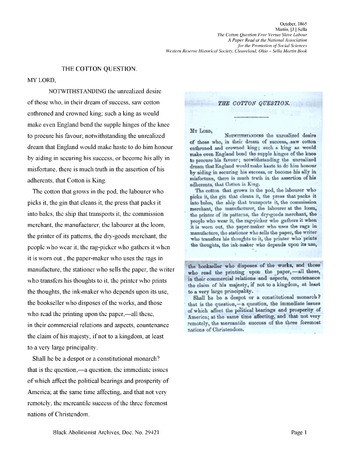
Speaker or author: Martin, J. Sella (John Sella), b. 1832
Newspaper or publication: Western Reserve Historical Society, Cleveland Ohio -- Sella Martin Book
The speaker traced in detail the benefits and the drawbacks of raising cotton. He stressed the value of the crop itself and its positive influence on the American economy. He linked this with the work of slaves who had given their health and lives to produce it. The remainder of the speech stressed the predicament that the emancipation of the slaves placed on those involved with cotton production. He also emphasized that the Negro was not inferior to the white race and he offered several examples to prove this. He believed the future of the production of cotton and other crops was with science not with "brute" man power. The idea of inferiority of one race was not a sound argument for slavery. He argued for the right of all human beings to be free.
Description of file(s): PDF 13 page, 3,682 word document (text and images)
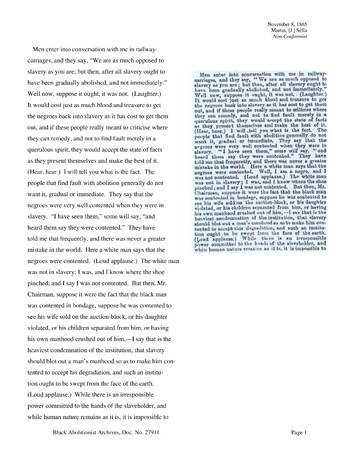
Speaker or author: Martin, J. Sella (John Sella), b. 1832
Newspaper or publication: Non Conformist
Speech addressing those who criticized immediate emancipation. The speaker also addressed the belief that the slave was content in his bondage.
Description of file(s): PDF 3 page, 890 word document (text and images)
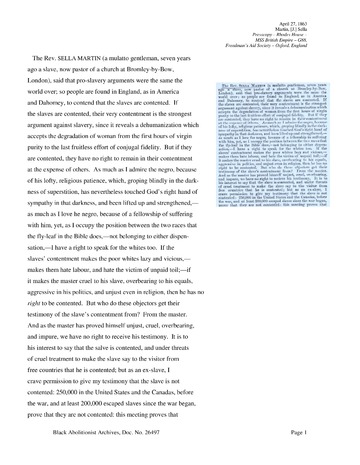
Speaker or author: Martin, J. Sella (John Sella), b. 1832
Newspaper or publication: Presscopy -- Rhodes House -- MSS British Empire -- G88, Freedman's Aid Society -- Oxford, England
Overview of a speech addressing the pro-slavery argument that the slave is content in his/her situation. This argument includes the idea that the slave has no right to his contentment if it interfers with another person's freedom. The speaker also eloquently addressed the argument of the inferiority of the black race.
Description of file(s): PDF 3 page, 968 word document (text and images)
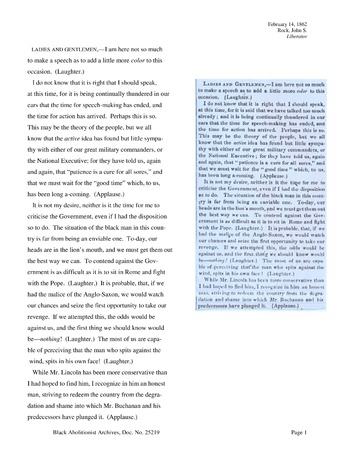
Speaker or author: Rock, John S. (John Sweat), 1825-1866
Newspaper or publication: Liberator
Speech regarding the influence the question of abolition has on decisions being made within the government during the Civil War. The speaker expressed his views about the war and its possible outcome.
Description of file(s): PDF 17 page, 5,123 word document (text and images)
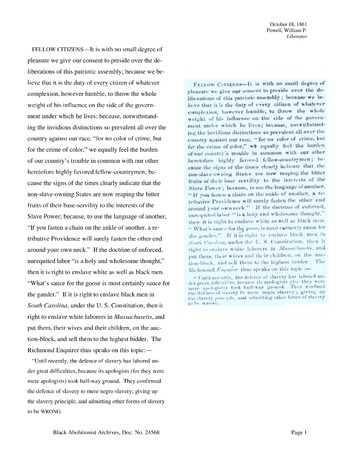
Speaker or author: Powell, William P.
Newspaper or publication: Liberator
The speaker addressed a recent essay noting that slavery had become morally and ethically understood in the U. S. as "Negro slavery." In this sense, only one form of slavery was "right" and any other form of slavery was considered "wrong." The government could then condone enslaving one segment of humanity and denounce and abhor enslaving any other. If slavery was admissible, he argued, then enslaving white people should be admissible as well. He also addressed the current conception that the slaves were content in their condition.
Description of file(s): PDF 6 page, 1,558 word document (text and images)



